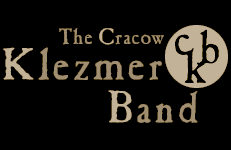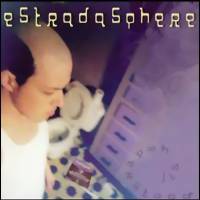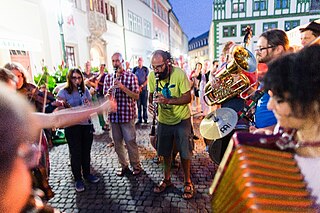Related Research Articles

Klezmer is an instrumental musical tradition of the Ashkenazi Jews of Central and Eastern Europe. The essential elements of the tradition include dance tunes, ritual melodies, and virtuosic improvisations played for listening; these would have been played at weddings and other social functions. The musical genre incorporated elements of many other musical genres including Ottoman music, Baroque music, German and Slavic folk dances, and religious Jewish music. As the music arrived in the United States, it lost some of its traditional ritual elements and adopted elements of American big band and popular music. Among the European-born klezmers who popularized the genre in the United States in the 1910s and 1920s were Dave Tarras and Naftule Brandwein; they were followed by American-born musicians such as Max Epstein, Sid Beckerman and Ray Musiker.

Naftule Brandwein, or Naftuli Brandwine, was an Austrian-born Jewish American Klezmer musician, clarinetist, bandleader and recording artist active from the 1910s to the 1940s. Along with Dave Tarras, he is considered to be among the top klezmer musicians of the twentieth century, and has a continuing influence on musicians in the genre a century later. Along with Tarras and other contemporaries like Israel J. Hochman, Max Leibowitz and Harry Kandel, he also helped forge the new American klezmer sound of the early twentieth century, which gradually gravitated towards a sophisticated big-band sound.

The Cracow Klezmer Band was a Polish jazz quartet formed by accordionist and composer Jarosław Bester in 1997 in the city of Kraków, and recorded for Tzadik Records. The group performed at Jewish Culture festivals in Hungary, Finland, Poland, Prague, and the Czech Republic. Its sound was different from what most people would consider to be traditional klezmer music — instead of danceable versions of traditional Yiddish songs, and free-form fantasies, and laments, The Cracow Klezmer Band played often dark and brooding but soulful and dynamic original virtuoso compositions instead in the klezmer form. Some songs could be considered dance pieces, but there were none of the traditional Bulgars, Freylekhs or Horas.

It's Understood is the first studio album by the experimental rock band Estradasphere. It was released on Mimicry Records on June 26, 2000.
Brave Old World is an American and German klezmer band. It formed in 1989. Members hail from the US and Germany. The Washington Post called Brave Old World "the revival's first supergroup. Every player is a virtuoso.” In 1992, the group won first prize at the International Klezmer Festival in Safed, Israel. Clarinetist Joel Rubin was a founding member.
The Klezmorim, founded in Berkeley, California, in 1975, was the world's first klezmer revival band, widely credited with spearheading the global renaissance of klezmer in the 1970s and 1980s. Initially featuring flute and strings—notably the exotic fiddling of co-founder David Skuse—the ensemble reorganized into a "loose, roaring, funky" brass/reed/percussion band fronted by co-founder Lev Liberman's saxophones and founding member David Julian Gray's clarinets. As a professional performing and recording ensemble focused on recreating the lost sounds of early 20th century klezmer bands, The Klezmorim achieved crossover success, garnering a Grammy nomination in 1982 for their album Metropolis and selling out major concert venues across North America and Europe, including Carnegie Hall and L'Olympia in Paris. The band performed steadily until 1993, regrouping in 2004 for a European tour.

The Klezmatics are an American klezmer music group based in New York City, who have achieved fame singing in several languages, most notably mixing older Yiddish tunes with other types of more contemporary music of differing origins. They have also recorded pieces in Aramaic and Bavarian.
3 Mustaphas 3 is a British world music band formed in 1982. Its core members are Ben Mandelson, Tim Fienburgh (1954–2008), Colin Bass, and Nigel Watson, around which orbit many other Mustaphas – all supposed to be the nephews of Uncle Patrel Mustapha. They claim to originate from the Balkans, but play music from various parts of the world. Their slogan, "Forward in all directions!", is an expression of this musical diversity. Active at the end of the 1980s and the beginning of the 1990s, they have now stopped producing and performing together, but haven't officially disbanded.
Quartetto Gelato is a Canadian classical crossover quartet with current members Colin Maier, Matti Pulkki, Kirk Starkey, and Tino Popovic, and based in Hamilton, Ontario. Their musical repertoire consists of a mix of classical masterworks with tangos, gypsy, klezmer, jazz, and folk songs from around the world. They usually play without musical scores and their performances include elements of humour and dance.

Joel Rubin is an American clarinetist, klezmer musician, ethnomusicologist, and scholar of Jewish music. Since becoming involved in the klezmer revival in the late 1970s, he has been researching, teaching and performing klezmer music and related genres. He has been a member of, or performed with, such groups as Brave Old World, the Joel Rubin Ensemble, and Veretski Pass.
Budowitz are a klezmer band incorporating 19th century instruments and themes from the folk music of Bessarabia, Galicia and Bukovina, into their music. Its members live in Hungary, Germany and the United States. The band is named after 19th Century accordion maker Karl Budowitz, who built the accordion played by Joshua Horowitz in the group.
The Kharkov Klezmer Band, also known as the Kharkiv Klezmer Band, is a klezmer band from Kharkiv, Ukraine.
Räfven is a Swedish gypsy punk band from Gothenburg, Sweden, performing original music influenced by Eastern European folk music and the klezmer tradition. The group was formed in 2003, as a reaction against the war in Iraq.

Kleztory is a klezmer and world music ensemble founded in 2000 and based in Montreal, Quebec, Canada. While remaining respectful of the rich heritage of klezmer, Kleztory takes the liberty of arranging parts of the traditional repertoire. This gives their music their own personal uniqueness and flavor. Kleztory is influenced by many sources of inspiration including jazz, classical, gypsy, country, folk and blues. The ensemble were awarded both the Opus Prize in 2007 as the best Jazz / World Music album of the year in Québec for Nomade, and the Fürth Klezmer Prize at the 3rd International Jewish Music Festival in Amsterdam in 2012.
Chaika is an Australian band. Originally formed as Di Khupe Heybners they play a mix of styles including folk, jazz, chamber music and they sing in Italian, Russian, Bulgarian, Hebrew, Romanie and English.
Sofia Magid was a Soviet Jewish ethnographer and folklorist whose career lasted from the 1920s to the 1950s. Among the materials she collected were folksongs of Volhynian and Belarusian Jews and among the only prewar field recordings of European klezmer string ensembles, as well as the music of Russians and other ethnic groups of the USSR. Although she was largely unknown abroad during her lifetime, in recent years she has been seen alongside Moshe Beregovski and other Soviet Jewish ethnographers as an important scholar and collector of Jewish music.

Pedotser, also pronounced Pedutser in some Yiddish dialects, was the popular name of Aron-Moyshe Kholodenko, a nineteenth century Klezmer violin virtuoso, composer and bandeader from Berdychiv, Russian Empire. He was one of a number of virtuosic klezmers of the nineteenth century, alongside Yosef Drucker "Stempenyu", Yehiel Goyzman "Alter Chudnover" and Josef Gusikov.
Michael Winograd is an American klezmer clarinetist and composer. He has performed with such groups and artists as Vulfpeck, Tarras Band, Geoff Berner, Socalled, Adrienne Cooper, Daniel Kahn & the Painted Bird and Michael Winograd and the Honorable Mentshn.

Yiddish Summer Weimar is an annual summer institute and festival for Yiddish music, language and culture which takes place in Weimar, Germany. Starting as a 3-day workshop in 1998, it was officially founded in its current form in 2006 and has grown to become one of the most important festivals and educational organizations for Klezmer, Yiddish song, Yiddish Language, dance and culture. It is known for its transcultural and transnational perspective which supports an international learning community, for the pedagogical approach of its founder, Alan Bern, and for its commitment to the creation and presentation of historically informed, contemporary Yiddish artistic production.

Christian Dawid is a German clarinetist, Klezmer musician, educator, and composer. He is generally regarded as one of the top Klezmer musicians in Germany, and has performed with groups such as Trio Yas and Khupe, as well as with international Klezmer groups such as Brave Old World, Daniel Kahn & the Painted Bird, Ben Caplan, Budowitz and The Other Europeans.
References
- ↑ "Introduction at the Veretski Pass official site". Archived from the original on 2008-08-07. Retrieved 2008-11-20.
- ↑ "Concert details at the Concertgebouw site" (in Dutch). 2006. Retrieved 2008-11-20.[ dead link ]
- ↑ "Veretski Pass album, at Golden Horn records" . Retrieved 2008-11-20.
- ↑ "Review and details of Veretski Pass album, at KlezmerShack". May 2004. Retrieved 2008-11-21.
- ↑ "Trafik album at Golden Horn records" . Retrieved 2008-11-20.
- ↑ "Trafik album, at CD Baby". Archived from the original on 2008-09-25. Retrieved 2008-11-21.
- ↑ "Klezmer Shul". www.veretskipass.com. Retrieved 8 February 2021.
- ↑ "Veretski Pass with Joel Rubin - Polyn, A Gilgul". Golden Horn Records. Retrieved 8 February 2021.
- ↑ "Veretski Pass with Joel Rubin - The Magid Chronicles". Golden Horn Records. Retrieved 8 February 2021.